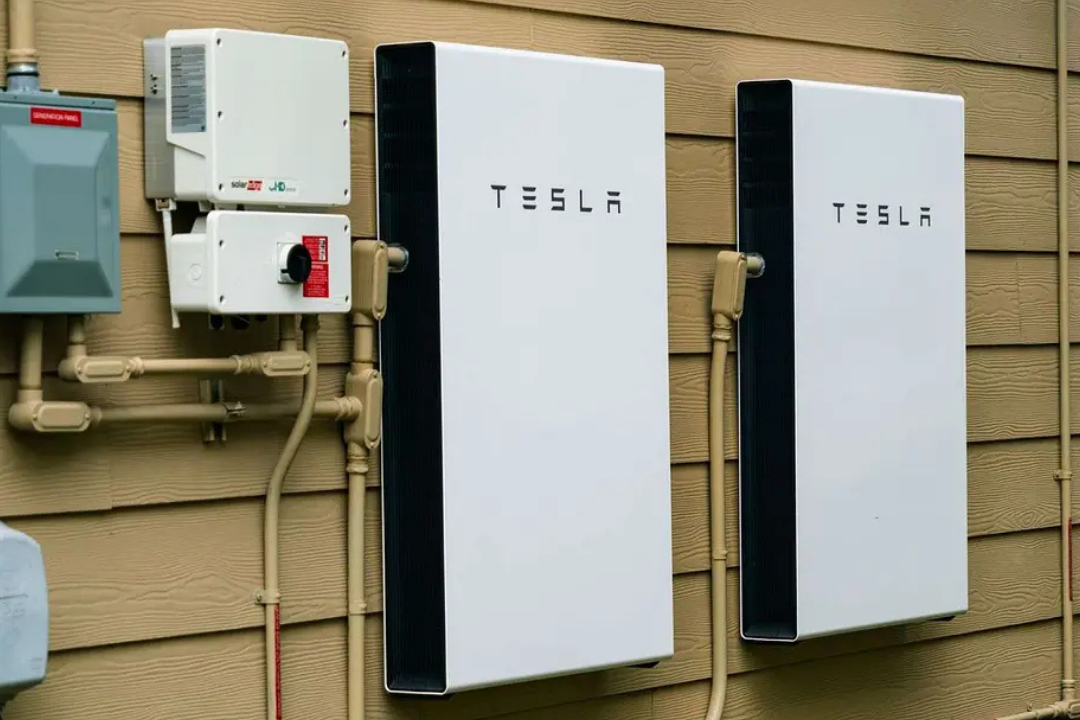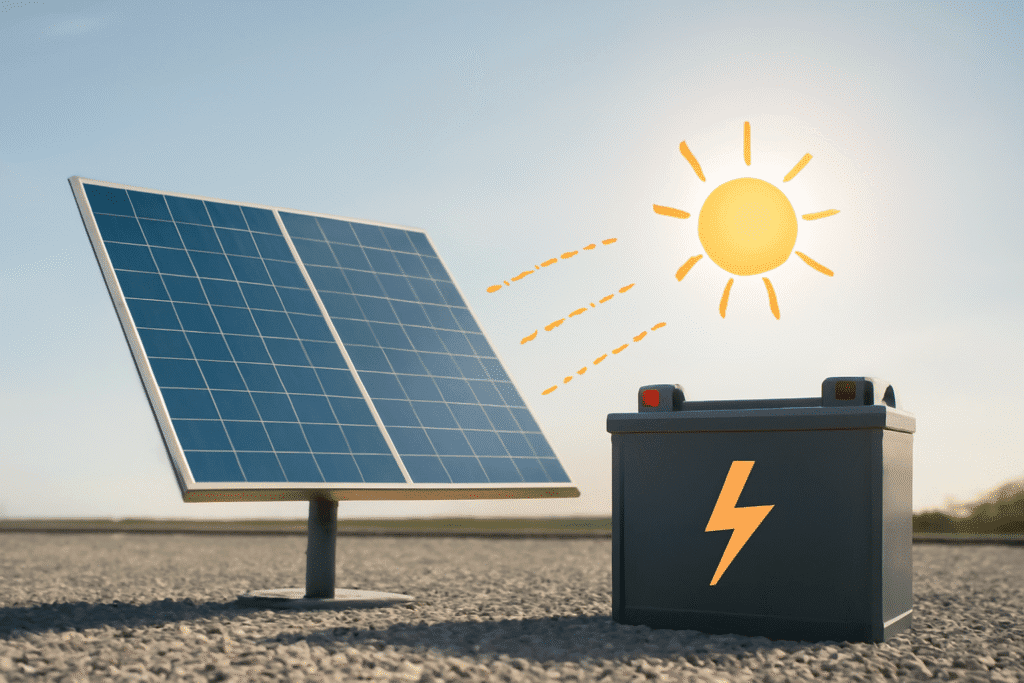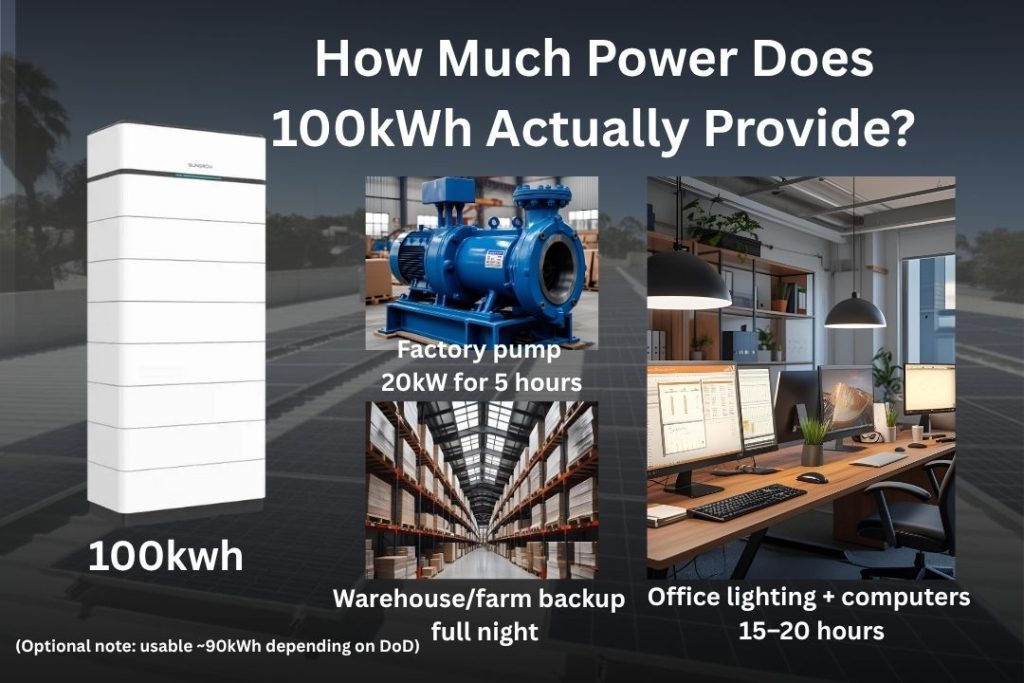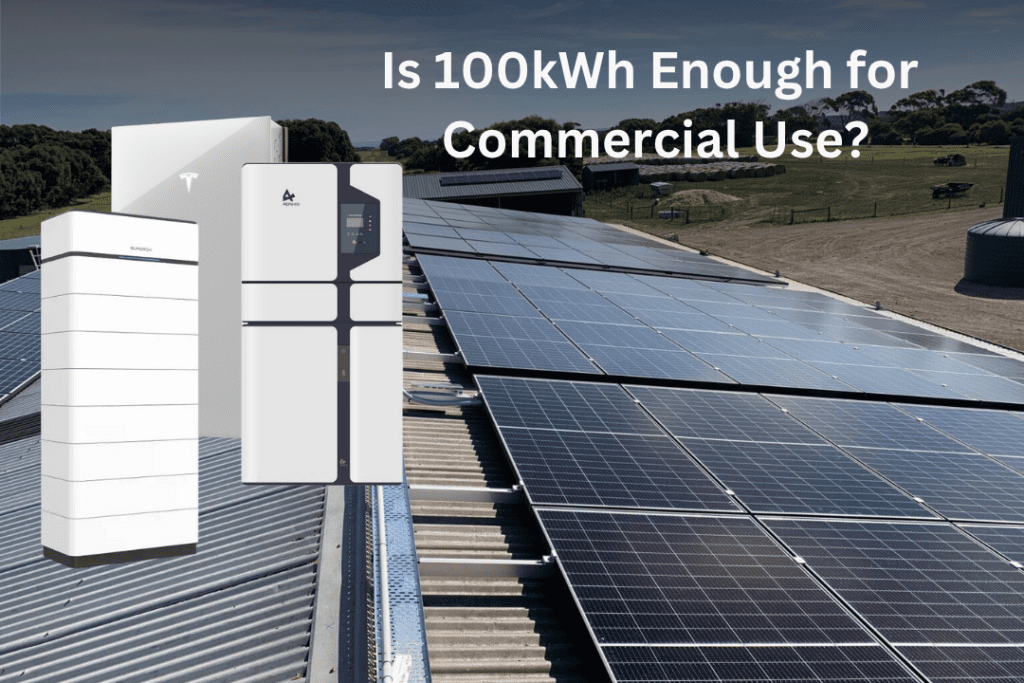SOLAR BATTERY STORAGE SYSTEM
100KWh
Large businesses, warehouses, and factories
$68,999*
get a quote
Submit the form below, our expert will contact with you shortly!
100kWh Solar Battery
100kWh solar battery packs a serious punch — it’s made for bigger energy needs, not your everyday home. Think factories, big farms, workshops, or off-grid setups.
In Australia, more and more businesses and organisations are going solar, and storing power with a battery like this just makes sense. You might notice that when the sun’s down or during a blackout, having a 100kWh system gives you serious peace of mind. It’s not too much, and not too little — just that solid base many commercial users look for.

DISCOVER THE BEST SOLAR BATTERY FOR YOUR SOLAR SYSTEM
40KWh
Solar Battery
Medium homes and small business
$
8,299
*
Small Home
- Complete Energy Solution
- 24/7 Power Backup
- Seamless Integration
- High-Quality Energy Storage
50KWh
Solar Battery
Large off-grid homes & business
$
9,999
*
Medium Home
- Complete Energy Solution
- 24/7 Power Backup
- Seamless Integration
- High-Quality Energy Storage
100KWh
Solar Battery
Large businesses, factories
$
68,999
*
Big Family Home
- Complete Energy Solution
- 24/7 Power Backup
- Seamless Integration
- High-Quality Energy Storage

What is a 100kWh Solar Battery?
When we say “100kWh solar battery,” that refers to its total storage capacity: roughly 100 kilowatt‑hours of energy ready to use.
These batteries are typically lithium-ion commercial-grade units, often VPP‑ready (Virtual Power Plant capable), so you can integrate into larger energy networks if you choose. Some models are made by big names in the industry — that kind of capacity is more common in utility or commercial setups.
How Much Power Does 100kWh Actually Provide?
Let’s break it down:
Running a 20 kW small factory pump for about 5 hours
Keeping lighting and computers in an office going overnight for maybe 15–20 hours, depending on load
Back‑up power in a warehouse or farm for a full night or even longer, depending on efficiency
In practice, usable capacity might be slightly less (say 90 kWh), depending on depth‑of‑discharge specs. But for rough planning, assume 100 usable kWh for simple calculations.

What is a Kilowatt-Hour?
Kilowatt‑hour (kWh) is just a way to measure energy usage over time. If something uses 1 kW of power continuously for one hour, that’s 1 kWh.
So, a 100kWh battery can deliver 100 kilowatts of power for one hour, or a long list of combinations: 10 kW for 10 hours, 5 kW for 20 hours, and so on. Simple but effective way to think about how much juice you’ve got stored.
How Many Kilowatt‑Hours Do You Need?
You’ll need to look at your typical energy use. A lot of Aussies find that small business operations, workshops, or farms consume around 50–150 kWh per day. If you want to cover most of your night or cloudy days, a 100kWh battery gives that buffer. You might go smaller if solar panel capacity is limited, or larger if you want multi‑day autonomy. Usually it’s a mix of solar generation plus loads—so base it on what you use after solar panels have done their work during daytime.
Benefits of Installing a 100kWh Solar Battery
One of the biggest benefits of a 100kWh solar battery is the major energy independence it offers. Whether you want to run off-grid completely or just get through occasional blackouts, this battery has got your back. Many businesses find they can cut down their hefty night-time energy bills by a solid chunk because they’re using stored solar power instead of expensive grid electricity. If your system supports it, you can even plug into Virtual Power Plants (VPPs) and earn credits, turning your battery into a money-saving asset. Plus, having a reliable battery means you can minimise your reliance on noisy diesel backups or generators.
All in all, it’s about building commercial resilience, saving big bucks, and having peace of mind knowing you’re doing your bit for the environment.
Any Downsides to Be Aware Of?
High upfront cost
You need proper planning—oversizing or undersizing can reduce ROI
Battery lifespan and cycle limits matter—you might need servicing or replacement after years
Installation space and compliance (Electrical safety certificates, installer accreditation) add complexity
But if you plan well, those cons soften pretty fast.
Price Breakdown in Australia
The starting price for a 100kWh commercial solar battery in Australia is around A$68,999, and installation usually adds A$1,000–3,000, depending on your site setup. If you’re also installing a solar system (like a 100kW array), that could cost an extra A$80,000–120,000. Altogether, a full package of battery, solar panels, and install might land somewhere between A$150,000–190,000, based on what your system needs.
Government rebates can knock a decent chunk off the price—especially with the federal program rolling out from July 2025. Just make sure you’re using a CEC-accredited installer and get a proper Certificate of Electrical Compliance so you’re rebate-ready and fully covered.
Is 100kWh Enough for Commercial Use?

Wondering if 100kWh is enough for your business? For many medium to large commercial setups, it’s just right. It can comfortably power workshops, small factories, offices, and farms during evenings and blackouts.
While it won’t make you fully off-grid, a 100kWh battery helps reduce your reliance on the grid and cuts down your power bills. But if your business runs heavy equipment all day, every day, you might need a bigger system.
For most Aussies, 100kWh strikes a good balance between cost and capacity — not too big, and not too small.
Why 100kWh Is Often the Best Choice for Commercial Use
A 100kWh solar battery hits a sweet spot for many businesses—it’s big enough to cover essential evening and overnight loads, reduce reliance on the grid, and deliver meaningful savings on power bills, all without breaking the bank. For medium to large commercial setups like workshops, small factories, farms, and offices, this capacity offers enough energy for real-world demand while keeping costs manageable.
Top Five Reasons Why 100kWh Works So Well
Max Rebate Eligibility – You get most or all of the government rebate on capacity up to 100kWh.
Reliable Backup Power – Covers evening and blackout use comfortably for medium to large operations.
Balanced Investment – Enough capacity to matter without overpaying for unused energy storage.
Peak Rate Advantage – Store solar power during the day and use it in expensive peak hours.
Energy Independence – Reduces dependence on the grid and even limits generator use during outages.
Government Rebates
Australia’s Cheaper Home Batteries Program starts from 1 July 2025. It offers up to 30% upfront rebate on battery systems from 5–100 kWh, capped per usable kilowatt-hour.
Eligibility:
- Battery must be new and VPP‑capable
- Paired with a solar PV system
- Rebate applies to up to 50 kWh of usable storage
- You must go through an accredited installer
You could save up to A$18,600 or more depending on your system setup and location. Some states also offer stackable rebates.
Lifespan & Warranty Info
Most commercial lithium-ion battery systems offer:
10‑year warranty on capacity (e.g. maintain 70–80% capacity after that)
Cycle life around 3,000–5,000 full cycles—so daily cycling could still give 8–15 years lifespan
Maintenance requirements are low, but monitoring and occasional calibration is smart
WE INSTALL CEC APPROVED POPULAR SOLAR BATTERIES IN AUSTRALIA






- Tesla Powerwall
Great for storing solar energy at home because it is very efficient and lasts a long time.
- Sungrow Battery
Works well and is affordable. It can be used in homes and businesses.
- Sigenergy Battery
A dependable storage option that focuses on being eco-friendly and simple to use.
- SolarEdge Battery
Works best with SolarEdge inverters and gives you excellent monitoring and control.
- Growatt Battery
A small, affordable option that works well.
- GoodWe Battery
A solar storage battery that is reliable, long-lasting, and very efficient.
